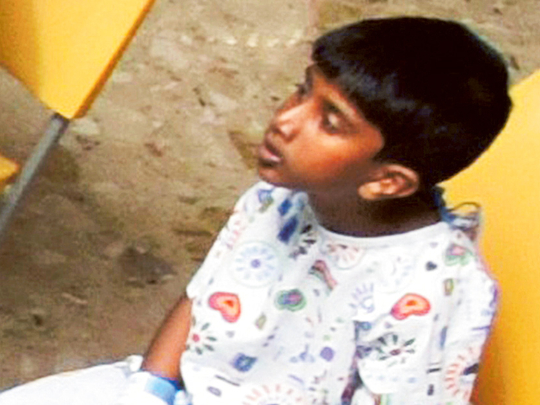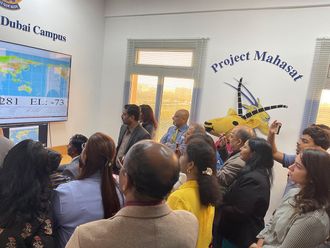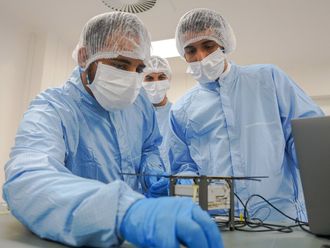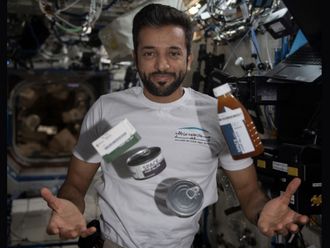
Rashid was born with six toes and six fingers, but his father, Mubarak Al Mansouri, was just thankful that the boy seemed otherwise healthy. What Al Mansouri and the medical team did not realise at the time was that the extra digits were a sign of a genetic disorder so rare that it would go undiagnosed for years.
“I asked the doctor why Rashid had extra digits, but the doctor said, ‘Why do you ask such a question? Are you going to love him less?’ I said no, I just wondered if there was a reason,” said Al Mansouri. Baby Rashid was discharged from the hospital in Abu Dhabi’s Ruwais area with no medical concerns.
As time passed, Rashid’s parents started noticing things about the boy — he was a little smaller than other children his age. However, they did not think much of it as regular check-ups with paediatricians showed nothing of concern. “He very playful, full of energy, so we never worried about his health,” Al Mansouri said.
But then Al Mansouri noticed Rashid’s teeth, which didn’t seem normal, and the father started to worry. “His teeth fell out easily, in even the smallest fall. Also, he didn’t have front teeth,” said Al Mansouri.
When Rashid was four, Al Mansouri took him to dentists in Ruwais and Al Sila areas of Abu Dhabi. The dentists gave him various explanations for the boy’s teeth, but Al Mansouri found none of them satisfactory.
After much research, he took his son to a dentist in Dubai, who examined Rashid’s teeth, observed his digits and small stature and advised Al Mansouri to take him for a check-up for a genetic disorder immediately. “We had never heard of this disorder but the doctor told us to not waste time as most people with this disorder can have heart issues,” Al Mansouri said.
A worried Al Mansouri took Rashid for a full check-up at a hospital in Abu Dhabi. Rashid’s test results confirmed that he had Ellis-van Creveld syndrome (EVC). The tests also revealed that Rashid had a hole in his heart and one of his heart’s valves was open. The news left Al Mansouri in complete shock and disbelief.
Rashid underwent heart surgery at age of five in April this year, which was successful. The boy is now on his way to full recovery. “Had the dentist in Dubai not been so knowledgeable, I don’t know how we could have known about Rashid’s heart condition and EVC. I don’t want to think about what could have happened to him,” said Al Mansouri.
Al Mansouri said he and his wife were relieved to know what their son’s condition was and that the worst part was over. He also hoped there could be advice out there for other parents who might have children with this rare genetic disorder and not know about it.
Weekend Review contacted the Clinic for Special Children in Strasburg, United States, which treats the largest number of children with EVC in the world, to get a better understanding of this rare genetic disorder.
“EVC is a class of genetic disorders, a type of skeletal dysplasia,” said Dr Katie William, Clinic for Special Children. She said that skeletal dysplasia in EVC cases means children will have a shorter stature than others their own age.
According to Williams, EVC is very rare in the general population but common in the Amish community. “It is one in 60,000 to 200,000 babies, in the Amish population it is about one in 200 babies.”
Williams lists the most common features associated with EVC, some of which could be seen as red flags. “Extra fingers and sometimes extra toes are usually the first signs; 50 per cent of children with EVC will have some type of heart defect or a hole in their heart, they can have some dental differences and sometimes they can be born with teeth, or when teeth do come in, they usually come in a different pattern and sometimes not in typical alignment. As children grow up some can develop knock knees, the upper lip can look a bit different, the ribcage is longer and narrower than other babies,” she said.
“It is very important to have this diagnosed because heart defects are so common [in children with EVC]. So if the baby has extra digits and you suspect EVC, the baby has to have their heart evaluated right away.”
She said if there is a heart defect that requires operation the timing of the surgery is critical. “For a baby with EVC who has small lungs and other issues, we found that if they can wait to have the surgery when they are older and stronger, they do much better.”
In her experience, on average children are operated on around the age of two. However, individual cases are treated differently as each child’s development varies.
Williams said that parents also have to be aware of knock knees because the condition might require surgery to correct it.
So who can have EVC? “Both parents have to be a carrier of this gene for the child to have it, it doesn’t happen spontaneously,” said Williams.
A simple genetic test using a blood sample can determine whether a child has EVC or not. Children with EVC do not have any intellectual disabilities, they do not require any medication and lead normal lives.
EVC is so rare outside of the Amish community that the doctors who heard about Rashid’s case have expressed interest in meeting him. They say he could contribute valuable information to the understanding of the condition.
EVC symptoms
-Short stature
-Extra digits
-Heart defect or a hole in their heart
-Dental differences
-Knock knees
-Difference in upper appearance
-Long, narrow ribcage
Diagnosis
-Genetic test using blood sample














